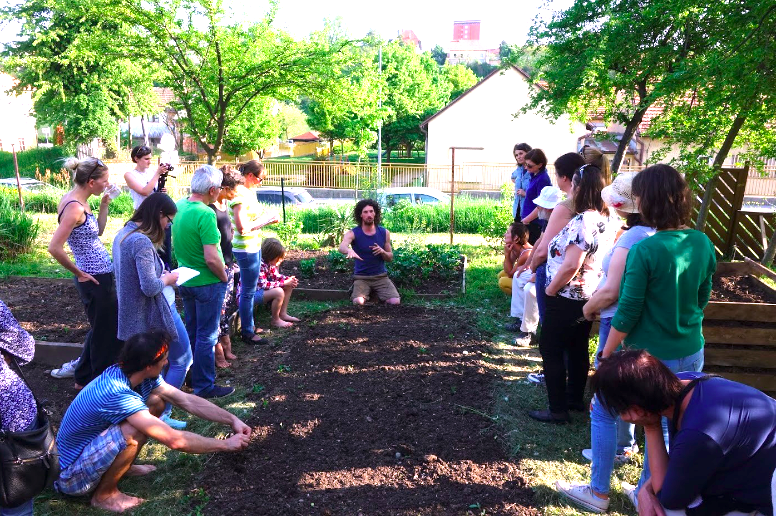The City of Maribor is piloting circular economy projects to close the material loops through the involvement of the municipal companies. In this interview with Igor Kos and Brina Lazar we understand more about their Urban Soil 4 Food project funded by the Urban Innovative Actions EU program.
What is the experience of the City of Maribor?
The city of Maribor is a front runner in experimenting circular economy solutions to operate local resource management, starting for the organisation of the municipal utility companies. Within the city strategy, a pioneering role is taken by the Urban Soil 4 Food project, that aims at establishing innovative soil based economy circles that will increase local food self-sufficiency and minimise the environmental footprint. Yet this is not only to be seen as an environmentally sustainable solution but also as an opportunity to launch new economies that will create local employment.
Maribor has an industrial past which has left a heritage of entrepreneurial attitude in its inhabitants, which also explains the presence of many international companies having settled their production premises. At the same time, the region is also well-known for the production of its high quality wine, yet the overall agricultural production is rather limited, making the city heavily dependant on imported goods. Recognising the limits of the current situation, the city aims at reaching food sovereignty by greatly investing towards the production of local food, through the education towards cultivation and healthy eating, as well as the support of innovative waste management mechanisms to generate soil out of municipal biological waste. To achieve this a local ecosystem of stakeholders has been jointly cooperating over a number of years and has teamed up within the Urban Soil 4 Food project to pilot new joint solutions.
What is the role of the municipal companies?
The experience in Maribor is based on the fact that the city does not wish to have a landfill and at the same time does not want to dispose of waste through incineration. For this reason, the city has elaborated a process of recovery of all types of waste resulting from utility companies, industries, farms as well as citizens. This allows to recover material by recycling, generating energy and producing new composites. A key role is played by municipal utility companies that carry out public services and that have recently started cooperating to sharing, repair, reuse and self-supply, as illustrated by diagram 1. Finally, the localisation of such services and activities in waste land in an opportunity to regenerate areas.
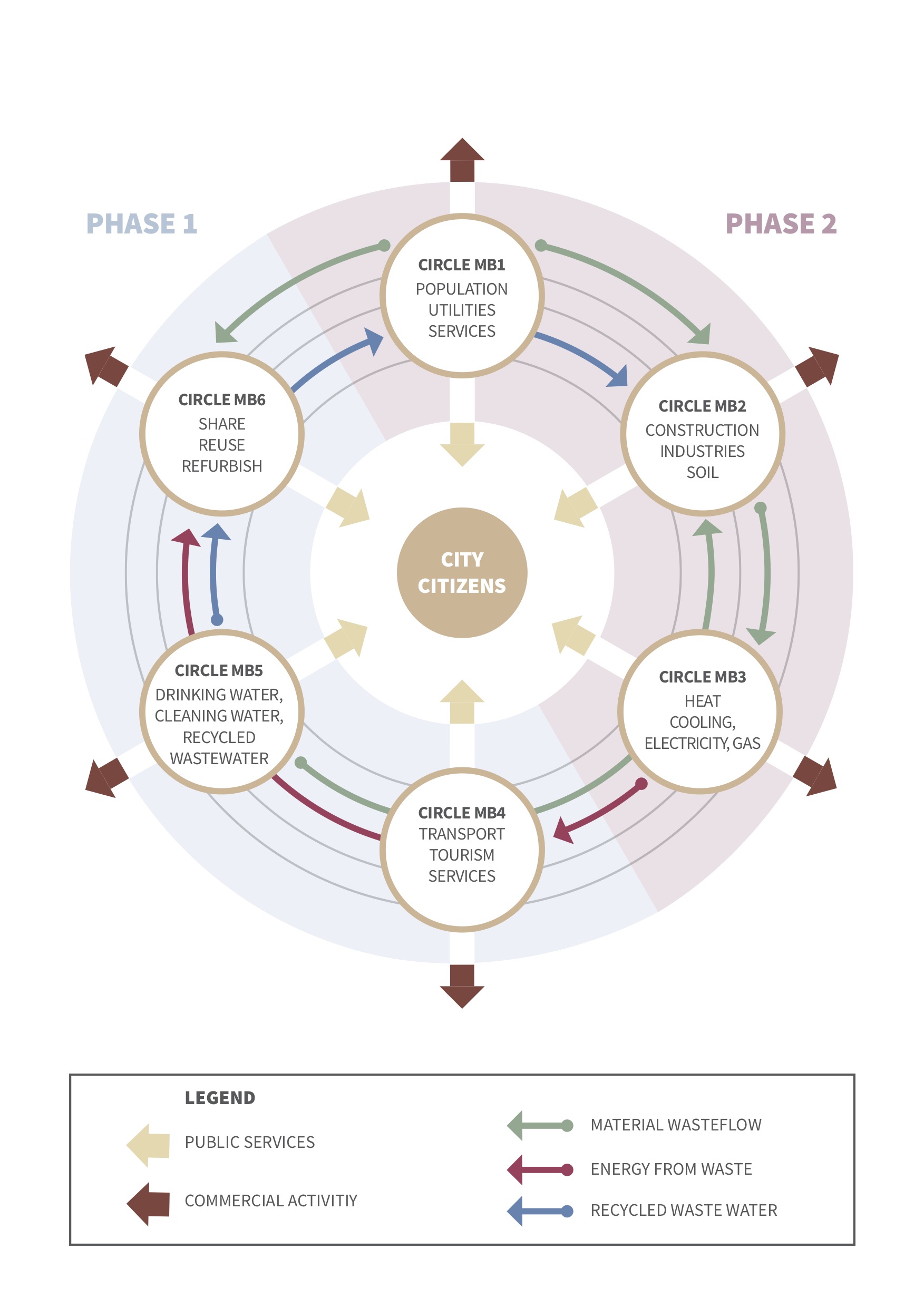
As the diagram illustrates, the input and output cycles allow to innovate process operated by municipal companies. Under such a system, waste of one company can be a resource for another, forcing them to cooperate. To smoothen such process the Wcycle Institute was established by bringing on board all representatives of municipal companies and the municipality itself to steer decisions within the circular economy model.
In terms of innovation, the Urban Soil 4 Food operates on two main aspects: technological innovation connected to the pilot plant and process innovation connected to the collaboration of the various municipal companies using other’s waste. The education and participatory approaches connected to the urban gardens and the platform that will be developed are key to ensure that the innovation will be shared broadly with local inhabitants, farmers, consumers, companies and many others. The project introduces urban food chains and uses open innovation processes to establish business support for innovative circular economy startups in the urban area. Knowledge circle provides project with internationally standardised soil and with training, seminars and study visits for stakeholders.
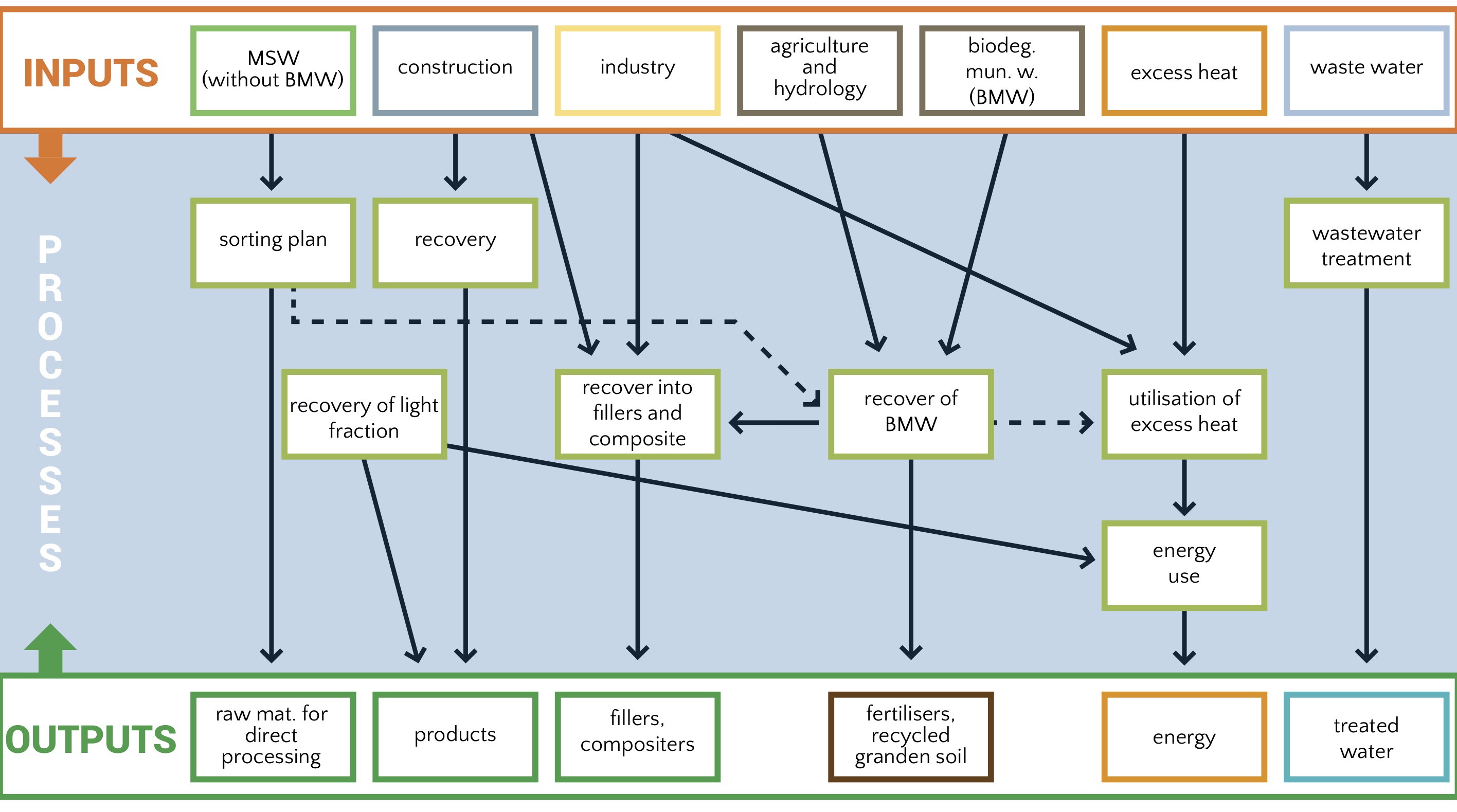
As the diagram illustrates, the input and output cycles allow to innovate process operated by municipal companies. Under such a system, waste of one company can be a resource for another, forcing them to cooperate. To smoothen such process the Wcycle Institute was established by bringing on board all representatives of municipal companies and the municipality itself to steer decisions within the circular economy model.
What is the Urban Soil for Food project about?
Urban Soil 4 Food is composed by three main goals: change the material flow, reach food sovereignty and increase societal awareness. The first goal is to achieve a change of the material flows from the currently unused ones which are going to the landfill to these being recycled and reused within the cities. By reducing the amount of waste in landfills, especially organic waste which is 2.400 tons/year and mineral waste which is 2.000 tons/year, it will be possible to produce different types of soil, up to 3,000 tons/year which can be used for urban agriculture, parks, roadworks or construction, as well as to produce energy to be used for the needs of operation of soil production. Particularly relevant in this respects is the production of certified soil that will go to the market.
Food sovereignty will be reached by establishing 7.398 m2 of new urban gardens for public use, based on the already existing practice throughout the city. Furthermore, the project aims at developing a local food label, which will be used by at least 50 farmers in the area. The label will be an important means to establish the local food chain between local farmers and local consumers, which are estimated to be at least 10.000 per year.
The third goal is to establish a societal change in awareness on circular economy. In fact, the community gardens are expected to bring circular economy closer to the people, as well as workshops will increase people’s involvement and interest to open innovation and the involvement of at least 15 SMEs to work in the field of circular economy.
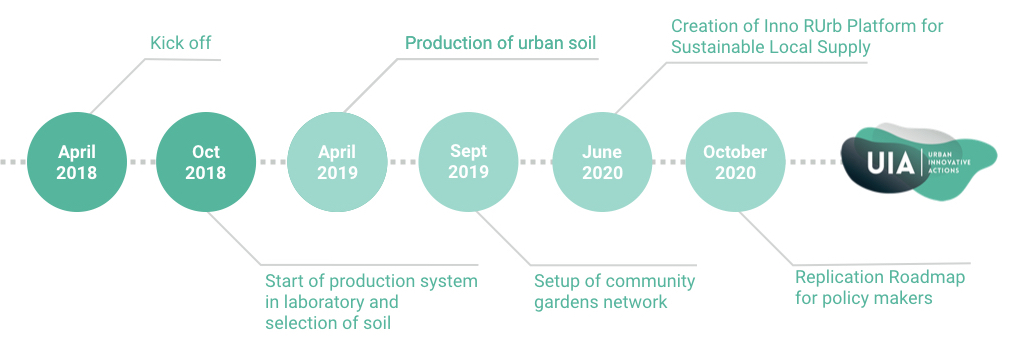
How is the project developing?
During the inception of the project, a great effort was made by partners to create the local cohesion and the network necessary to effectively establish the ambitious goals of the project. From a factual point of view, four key activities have been carried out, as fundamental to the further development in the upcoming years.
Firstly, the Kick-off has served as an opportunity to create local public awareness on the project through press news that allowed stakeholders and target groups to get acquainted with the project. In fact, already in spring a series of workshops were carried out by Aktiviraj se in order to advise the interested public about permaculture, how to maintain a garden without digging and about efficient urban gardening.
Secondly, partners have been involved in the set up of the community garden by identifying the pilot area, developing the plan and starting the community involvement to define the activities to be carried out in spring. To raise awareness, a vertical garden was created as a learning example for the establishment of more gardens that we have envisaged in the project. Currently the stakeholders are involved in the development of the gardens, the orchard and the educational space.
Thirdly, up until now partners have been involved in the development of a laboratory system for the production of soil, carried out by ZAG. Snaga has provided different soil mixtures (mixtures with different ratios of compost, bio-charcoal and excavated soil) as well as their individual components which were tested by ZAG according to Slovenian standards (e.g. adequacy of compost, etc.). Clear results on which mixtures are to be used for urban soil production to achieve optimal results have been gathered and made ready for further uptake and demonstration of the project.
Finally, a more technical but essential element has been carried out, this being the setup of the public procurement process for the technology of the innovative pilot plant, carried out by Snaga in close cooperation with all local stakeholders in order to gather as much input on requirements.
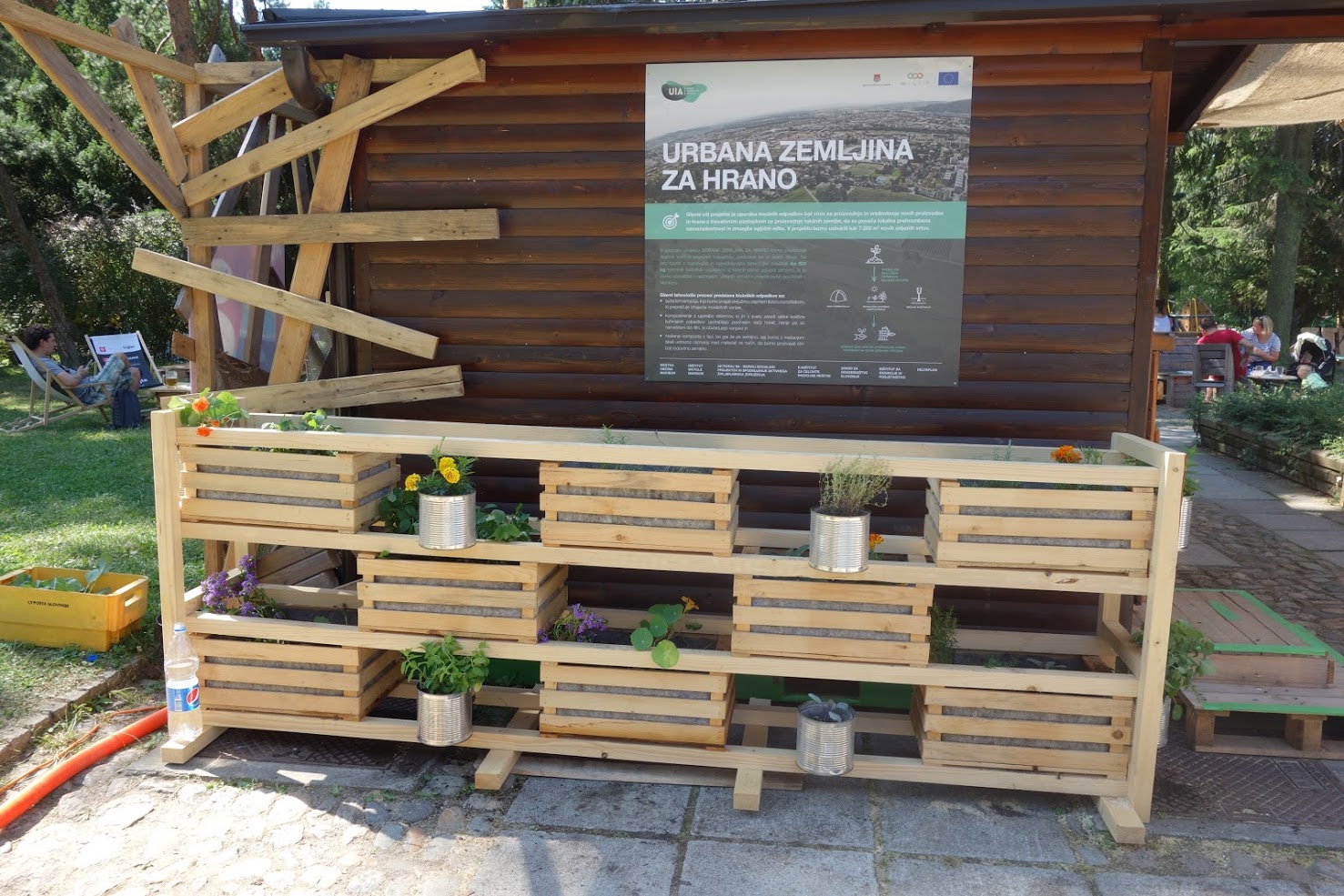
All local partners have been greatly involved in the development of the different items experiencing great cooperation and resilience to adapt the plan to the needs and challenges encountered along the project setup. The upcoming activities in 2019 will be the official start of the urban soil, with the final technological optimisation to be carried out on each soil type, the community gardens being operational, motivating the public towards organic gardening, and the local food chain will be established and operational, with a cooperation between local producers and local consumers.
How do local partners work together?
The City of Maribor is in charge of the coordination of the project with a strong commitment from the Mayor and from departments.
In this stage a very important role has been played by the Slovenian National Building and Civil Engineering Institute (ZAG), who is responsible for the evaluation and certification of the urban soil prepared within the project. At this stage it has carried out a series of experiments on salad growth as well as on green walls and green roofs using different types of soil, evaluating the growth of the plants and the water absorption. At a latest stage ZAG will be the responsible authority to standardise and internationally certify recycled urban soil), for which they are currently looking into standards and carrying out a survey in order to ensure that the certification is complying to all Slovenian and EU standards. Based on the certification, the municipal company Snaga will develop a protocol to develop the soil.
The Institute of Innovation and Entrepreneurship deals with rural development, agriculture and tourism. They are based in Maribor and deal with agricultural companies in the region since 20 years. Within this project they will be responsible for the development of a platform b2b on local food and information from public sector (primary and secondary schools, gastronomy, hotels). Within the project they will contribute to the development of a food chain but especially towards a sustainable supply demand platform. Currently they have started preparing the interviews to stakeholders, 100 of which will be carried out within October and December.
Based on the initial conversations with local farmers what is emerging is that:
- Up to now only 20-25% of food supply is currently local, therefore the goal is to raise it, starting from the public demand and then ranging towards the private home consumption too.
- According to what currently local farmers can produce, the local consumption could reach the 40-45% but they don’t know how to sell their products.
- for the moment there isn’t a clear overview of the current offer and demand. Therefore another tasks being carried out for now is to map all the local farmers, as the currently list doesn’t provide and extensive overview of what they produce.
- The profile of local farmers is that they are small, operating on plots of land between 2-8ha, and mainly producing biologically, which are very small and require additional support to get on the market.
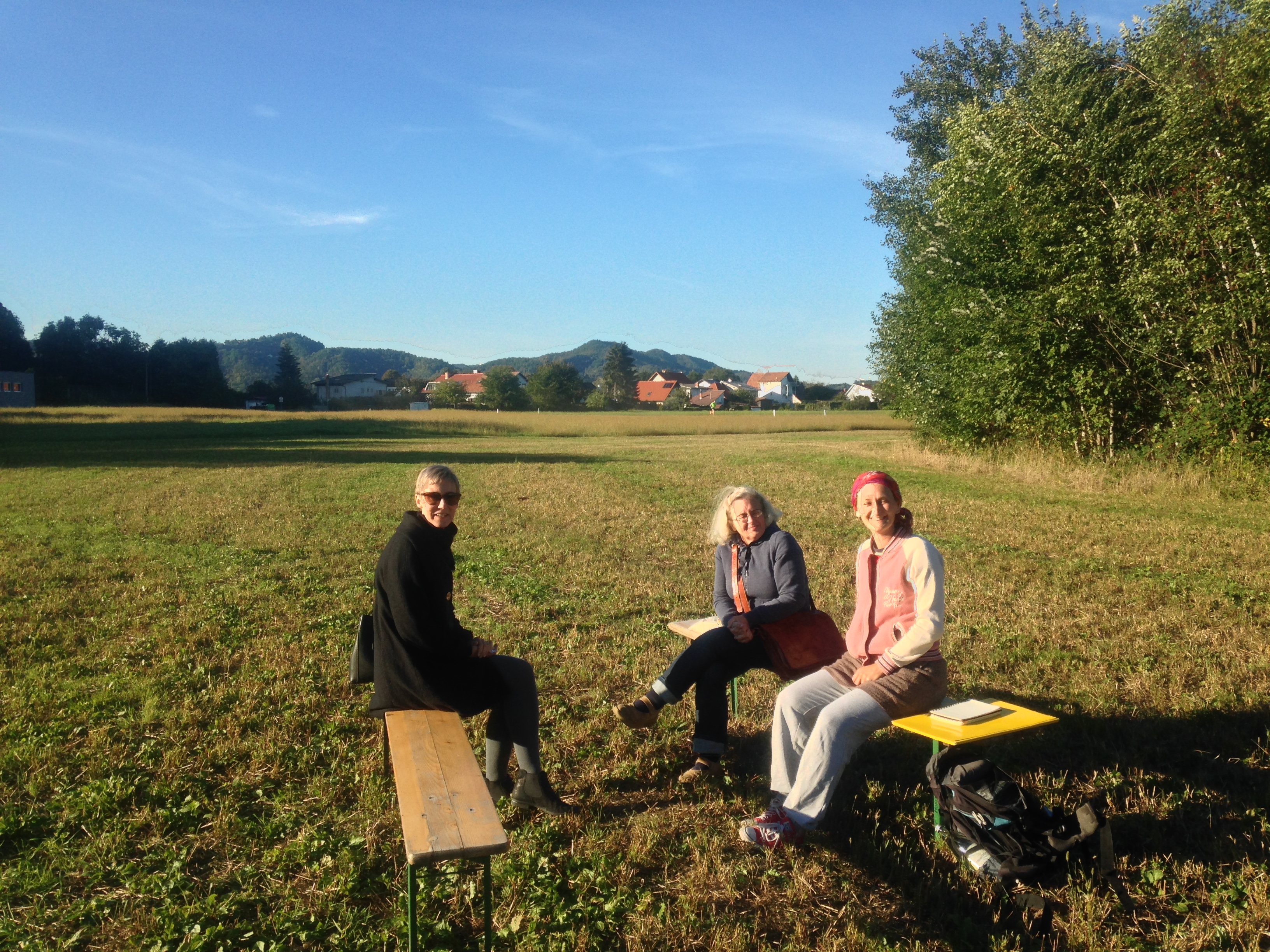
The Aktiviraj se (Activate Yourself) NGO exists since eight years and manages gardens since five years with the goal to activate young or long terms unemployed people. They are also a social enterprise managing a reuse centre, a second hand and rehabilitation/up-cycling centre that creates their biggest income.
The garden they currently run covers 800 m2 with ten volunteers organising workshops on biodynamic agriculture and similar educational activities. Within the framework of this project they are responsible for the urban garden and its planning. There will be a new affordable housing complex in front of main entrance of the urban garden in two years time, which will allow to attract part of the new users. The plan is being also defined with the input of the nearby urban garden setup during the EU Capital Culture of 2012, from whom they gathered information on previous experience. For example, in terms of the size of plots, it emerged that the best option is 30-50m2 each, which would create approximately 60 gardens, aside of the orchard, the community space, for which the plan will be ready by end of 2018.
The WCYCLE Institute is bringing together all the municipal utility companies and uses waste of one as resource for another. In its present form it has been existing since 1,5 years and has been very active in EU projects which help the development of new concepts and then the creation of ongoing activities. In the near future, the aim is to sell services to private sector despite only public capital can be involved.
Deltaplan is a private consultancy company specialised in sustainable solutions, which is particularly involved in the development of WP 7 on knowledge and WP 4 on material circles and will cooperate closely with ZAG on the soil recipes and legal permits, tasks for 2018 and 2019.
Snaga is the waste management company of the City of Maribor with 100 years tradition and currently focusing on circular economy. This project is a chance to recycle biological waste so that it stays in the city and therefore Snaga plays a fundamental role in the implementation.
“The scope is not to lose any waste!”
To get most out of different kind of urban bio-waste we would need three technologies to: 1) make food 2) grow grass and 3) for construction/remediation systems. Today the City of Maribor already collect 21% of biological waste, what is 13.000 tons of bio waste per year, mainly coming from separate collection of bio waste, then from city parks in the form of grass, trimmings and wood. Snaga currently spends 1 million euro to sell its biological waste. The reduction of costs would be especially related to the reduction of the transport and the different management as waste would not require storage.
What have partners learnt up to now?
The Urban Soil 4 Food partners have built up over the past months a cohesive cooperation system, which has allowed them to establish a resilient mechanism to overcome challenges and adapt to local needs according to regular small changes in the work plan. Such a system of trust is greatly based on the fact that most local partners had already worked together in previous project, therefore proving their reliability and professionality.
In these respects a major role is played by the City of Maribor, that has ensured a strong political commitment of the Mayor himself as well as a constant backup of the administration in terms of project management and administrative support to the project development.
For ZAG up to now the main challenge faced was that the Laboratories have predominantly had experience with stone, aggregates and recycled materials, therefore having to expand within this project their know-how to soils. For the project needs, experts will strengthen and upgrade their knowledge regarding soil testing, and soil certification and standardisation. This will allow ZAG to broaden their areas of expertise and become more competent on the market. The main expectations from ZAG within this project are to set up new projects and get more companies asking for certifications in the new field of soil science, related to the URBAN SOIL 4 FOOD themes. Currently, nowhere in the world there is a certification on soil, because this is a living organism, so the biggest challenge is whether it will be possible to certify the soil.
The Institute of Innovation and Entrepreneurship has been learnt up to now that “Time is the most valuable currency of farmers”, therefore in order to have some of their time it is necessary to go on site and carry out interviews whilst they are working. Another learning is that there is a generational change in the perception of rural work, as younger farmers are looking not only in agriculture but more broadly in rural businesses, but need support in the analysis of the supply-demand. In this sense, there is a LEADER project in the area but due to administrative problems it provides little financial support. On the side of consumers they don’t know where to buy and how much, especially when looking at the perspective of schools, catering and hotels, because they need fix amounts. Individuals instead are more flexible according to the availability.
Aktiviraj se already started involving some of the nearby inhabitants in the community garden setup and have received requests from people wanting a plot, therefore there is a high demand and they don’t expect having problems in getting people. The goal is not about providing self-sufficiency but about improving education around healthy eating and biological cultivation. In 6 months’ time there will be the first orchard with traditional old fruits and one part of the community gardens will be prepared for being used during spring. The foreseen upcoming challenges could be:
- How to get people involved in the educational part, which could be overcome by making a rule that tenants of the gardens have to attend 80% of the workshops.
- Schedule might be tight because of all the things to be done within the project, much of which is interlinked with activities from other partners.
- Infrastructure in the garden, as water and electricity are currently missing on site, which might take a long time and there are different understandings in the group on how to solve the matter.
- Overall there is a big dilemma for the future after the project ends, which is the business plan of the gardens.

At the very start Wcycle Institute greatly contributed to the overall coordination of the project, until the current project manger was hired by the City, allowing the organisation to reinvest fully its resources on the project activities. Wcycle’s member Igor Kos is leader of the work group 2 for the gardens, therefore being closely involved in the operational parts of its development. Wcycle is greatly involved in the coordination of many of the activities, currently the urban community gardens in particular. In the upcoming development of the project it will be involved in two working groups, the knowledge and the food ones.
Deltaplan has been greatly involved in providing technical back-up to the project. A key learning has been to start whenever possible the preparation of tasks even prior to the expected schedule in order to overcome potential challenges. For this reason they have already identified as challenges the development of documentation for environmental permits and consents, which are fundamental, the involvement of local communities in the pilot plant, which is much less attractive to the public than community gardens, and the co-creation of the pilot plant erection, which might be difficult in more general terms. For this reason they have learnt that it is essential to strengthen capacities of public utility companies, as the circular economy entrepreneurial approach is extremely new for them, and that SMEs need to be involved in the implementation phase.
Snaga play a key role in the technical development of the project, especially in terms of waste management and recycling. For this reason they started considering relevant project elements such as the upscaling of the project after the end of the UIA, which is why they started working on it. A key learning for them has been that even though the timeline is defined as a linear process, there are often ups and downs that partners need to be able to adapt to. Finally, during the technology study with the conversations with the stakeholders the technology characteristics have been adjusted to reach better solutions.
The interview with Brina Lazar (Maribor Municipality) and Igor Kos (Wcycle Institute) was carried out by Daniela Patti as part of the Journal of the Urban Soil for Food project funded by the Urban innovative Actions European program.

